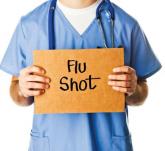Immunization. It's not just for patients anymore. But was it ever?
"It is extremely important for health care workers to get vaccinated every year," said Dr. Thomas Talbot, author of the Society for Healthcare Epidemiology’s vaccination guidelines and chief hospital epidemiologist at Vanderbilt University Medical Center in Nashville, Tenn. Health care workers are diligent by nature, and they often come to work when they are sick, he said. Also, healthy adults often shed the flu virus before they are infected, and they might attribute a runny nose or early flu symptoms to a cold, he added.
Safety issues aside, some hospitals and organizations have made immunization a condition of employment, Dr. Talbot said. "It is now being seen as a professional responsibility," he said.
Dr. Talbot served on the review panel for " Strategies for Implementing Successful Influenza Immunization Programs for Health Care Personnel Project ." A 10-month effort completed in 2009, the Joint Commission project sought to provide information about barriers to successful flu vaccine programs along with strategies for overcoming them.
The Centers for Disease Control and Prevention has also weighed in, recommending flu vaccination for all health care personnel, based on the advice of the Advisory Committee on Immunization Practices and the Hospital Infection Control Practices Advisory Committee.
According to the CDC, health care facilities should offer easy-access vaccination sites and "targeted education about the disease, including disease risk among HCP and patients, and about the vaccine."
"You have to really try to address the misconceptions of the vaccine and there are things that are not proven by science," Dr. Talbot said.
The right attitude can go a long way, he added, pointing out that flu immunization programs for healthcare workers are more likely to succeed if they are presented in a nonadversarial way, with an emphasis on improving safety for patients.
For the latest information on this season’s flu vaccine and vaccine safety, check out the Centers for Disease Control and Prevention’s Seasonal Flu section.
